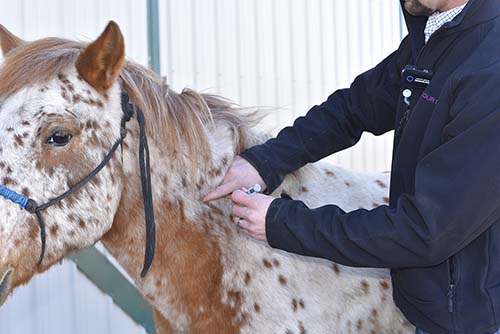
An entomologist and veterinarian discuss the unremitting mosquito.
While much of the Western half of the United States endures near historic drought levels, one might anticipate this year’s mosquito season to be a walk in the park.
No Rain, No Problem for Mosquitoes
“Just because we don’t have rain, doesn’t mean we don’t have mosquitoes,” explains Department Head for Entomology and Plant Pathology at Oklahoma State University, and former livestock entomologist, Justin Talley, PhD. “Some of the most significant West Nile virus outbreak years have been associated without significant rainfall. Be aware, just because you don’t see water, doesn’t mean there are no breeding areas around.”
Dr. Talley shared how the Culex mosquito, which is responsible for transmitting core equine diseases such as West Nile virus (WNV), can populate in the most unsuspecting places. Standing, puddling water is not needed. “One would think that wet years equal more equine West Nile virus cases; however, the type of mosquitoes transmitting these equine diseases can develop in muddy water or a storm drain. There’s a lot of water you don’t see.”
Even a tiny hole in a tree – with just a bit of water – is enough for the Culex mosquito to repopulate within.
“The thing about mosquitoes is they’re very diverse in the habitat they can modify to, and it’s their adaptive behaviors that allow them to be successful,” Dr. Talley said.
As risk remains for mosquito-transmitted equine diseases, even in areas impacted by drought, is your horse protected?
“Once our nighttime temps are above 50°, or daytime is above 80°, that’s the likelihood of when mosquitoes will develop,” Dr. Talley said.
3 of 5 Core Equine Diseases Spread by Mosquitoes
Horses are threatened with mortality rates up to 90% from mosquito-transmitted diseases.
“The three big equine diseases transmitted by mosquitoes are West Nile virus, Eastern equine encephalomyelitis (EEE), and Western equine encephalomyelitis (WEE). Venezuelan equine encephalomyelitis (VEE) isn’t typically a problem, but there have been years with outbreaks in specific areas,” warns Tony Hawkins, DVM, Valley Vet Supply Technical Service Veterinarian.
These diseases can attack and inflame a horse’s nervous system. EEE, WEE and VEE are spread to horses by mosquitoes, which feed on infected birds and rodents that serve as the virus reservoirs. WNV is transmitted by mosquitoes, which feed on infected birds.
4 Tips to Protect Your Horse
TIP 1: Vaccinate horses.
Horses all across the country are at risk for West Nile virus. It’s important to vaccinate horses before, or at least early in, the mosquito season. Vaccines provide horses with long-lasting immunity. “When horses receive their two initial doses, then after that they have a yearly booster, we will have a good response seven days post vaccination,” said Dr. Hawkins.
TIP 2: Hang livestock fans.
“We know that putting fans on horses will prevent some of the mosquitoes from feeding on them – it’s a good, natural thing to utilize. If it’s a slow-moving fan, like a box fan in your barn by your stall, it won’t do much. But a high-powered fan, that’s going to help keep away the mosquitoes,” said Dr. Talley.
TIP 3: Rid standing water.
Dr. Hawkins encourages that horse owners eliminate as much standing water as possible, and empty and clean their horse’s water sources at least weekly.
TIP 4: Minimize horses’ exposure.
Keep horses inside the barn under fans during prime mosquito feeding times, which include dusk and dawn, encourages Dr. Hawkins.
Take steps to keep your horses safe and comfortable, as mosquitoes make their presence known. Continue learning about horse health at ValleyVet.com.
About Valley Vet Supply
Valley Vet Supply was founded in 1985 by veterinarians to provide customers with the very best animal health solutions. Building on over half a century of experience in veterinary medicine, Valley Vet Supply serves equine, pet and livestock owners with thousands of products and medications hand-selected by Valley Vet Supply Technical Service veterinarians and team of industry professionals. With an in-house pharmacy that is licensed in all 50 states, and verified through the National Association of Boards of Pharmacy (NABP), Valley Vet Supply is the dedicated source for all things horse, livestock and pet. For more information, please visit ValleyVet.com.
There are more informative articles in our section on Health & Education.

































